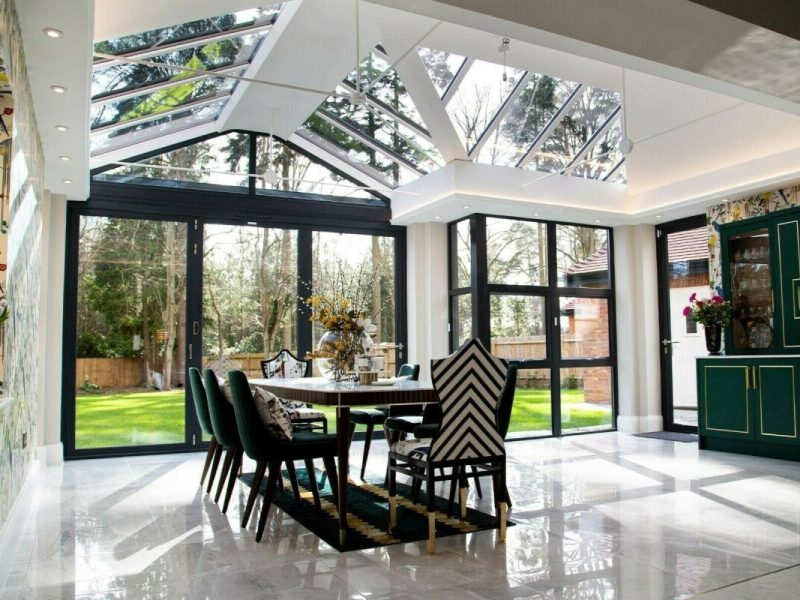Conservatory Buyers Guide: Part 3

Who are Ultraframe
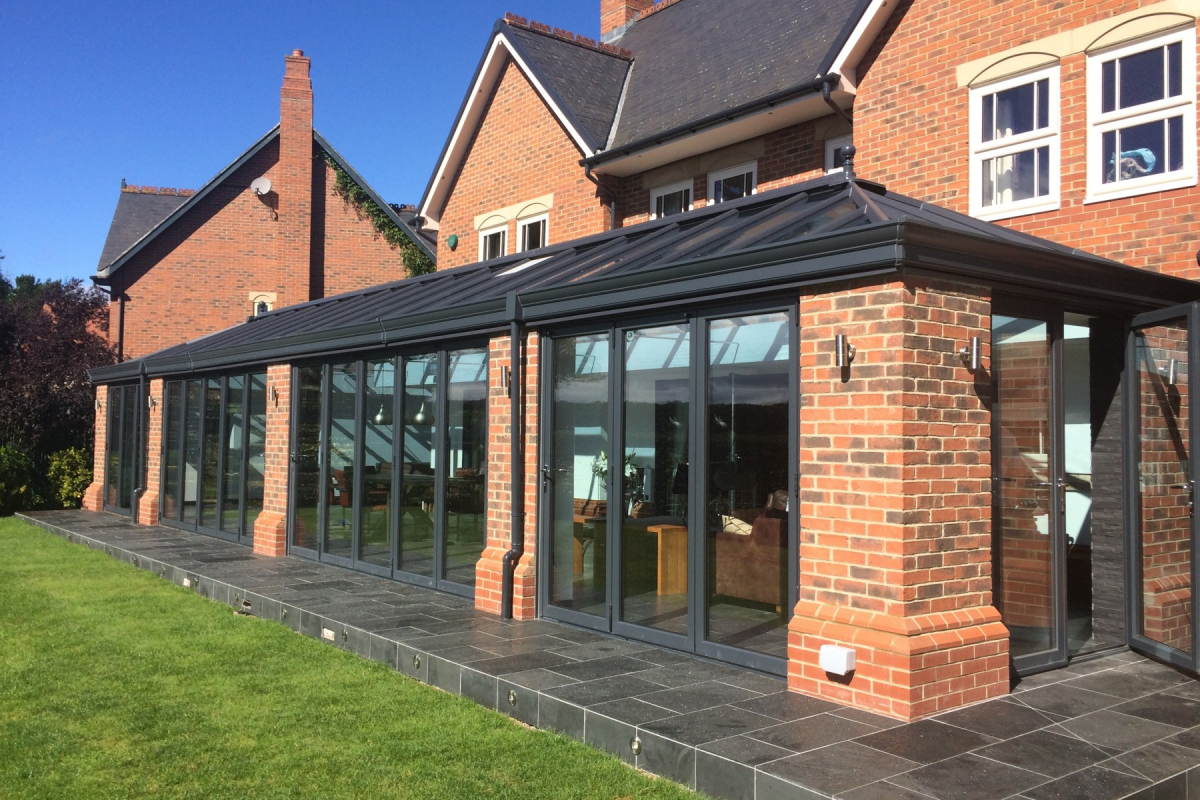
Ultraframe, have been at the forefront of conservatory technology & design through constant evolutionary development for over 30 years. The roofs are independently third party tested by Wintech and the British Board of Agrément (BBA).
They are currently the only conservatory roofing system with BBA accreditation, and a minimum 25-year life expectancy.
With their extensive roofing knowledge, they advise the industry on technically innovative construction methods for building conservatories and home extensions. They provide comprehensive information about designing conservatories and offer conservatory advice to homeowners who wish to add an Ultraframe conservatory to their home, using one of their BBA approved Ultra Installers.
Personal Expectations For many people, buying a glazed extension is a one-off opportunity to transform their home and how they use it, so it pays to understand the key issues that will help you make informed decisions along the way.
Buying a glazed extension should be given as much consideration as adding a brick-built extension to your home. Planned properly, it will last you for years to come, provide you pleasure every time you enter it, and add value to your property. Get it wrong, and it could be too hot, too cold, too small, gloomy and unbalanced with the house. The bottom line is that you have wasted your money on a room that you cannot or do not want to use.
Sounds dramatic? That’s because for some it can be. With a glazed extension you really will get what you pay for. Cheap, poor quality materials will only give you a glazed extension that looks good for a very short time – in some cases only until it next rains or the sun shines! You probably wouldn’t build an extension without some level of professional advice, but this is exactly what many homeowners do, and then end up with something that couldn’t be further removed from their dream room.
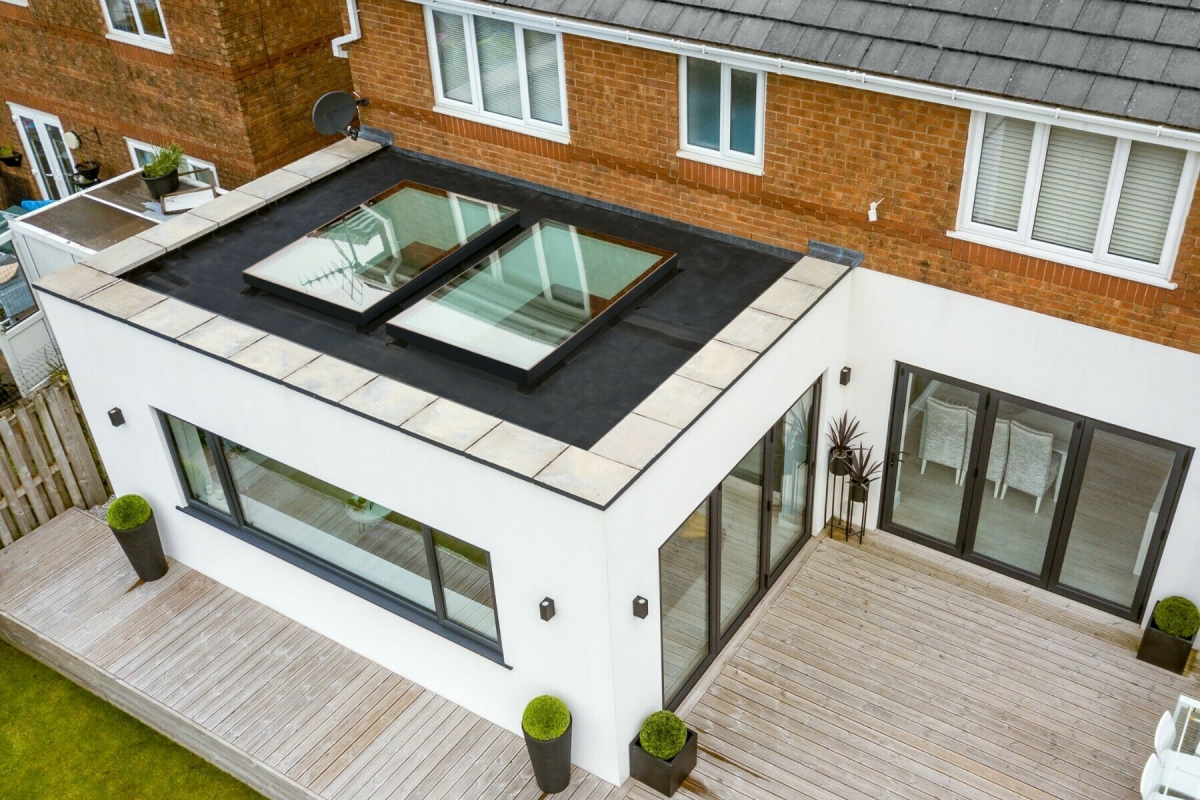
Start by asking yourself: What do I want to use the new structure for? Are you looking for extra living space, a playroom for growing children, a kitchen, back to contents home office, dining room or a studio? All uses are possible as long as you understand how to make the glazed extension work for the type of room you want it to be.
Knowing what you want to use your glazed extension for will almost certainly have a bearing on how it will be constructed; a sun room for use in the summer months will not be the same specification as a room that is designed for year-round living.
Personal planning for your conservatory
Good quality planning, design and construction will ensure you have a room that is neither too hot nor too cold; can be used exactly as intended without compromise and stays looking as good as the day it was finished for many years to come.
Sadly, all too often homeowners are left with glass extensions that are poorly constructed, leading to damp and water penetration; that become unbearably hot as soon as the sun appears; and has them running for the peace of another room whenever it starts to rain.
Avoiding these problems is actually quite simple and comes down to research and working with a reputable company that really does want to deliver a conservatory or orangery you can enjoy and inhabit.
Finding a reputable supplier is probably one of the most important parts of any research you do into your proposed purchase. Don’t be tempted by those companies that sell on price alone as you could end up being disappointed with your purchase in the long term. Look for a company that is well established.
“We seldom sell polycarbonate roofs, the majority of clients look to have self-cleaning solar reflective glass when opting for a traditional conservatory. They will gain more all-year-round usage, with better thermal efficiency properties, have clearer vision with advanced light quality and it’s less noisy. Glass may cost more but it will last longer, therefore making it more economically efficient in the long run”
Solid Roof Conservatories In Devon and Cornwall
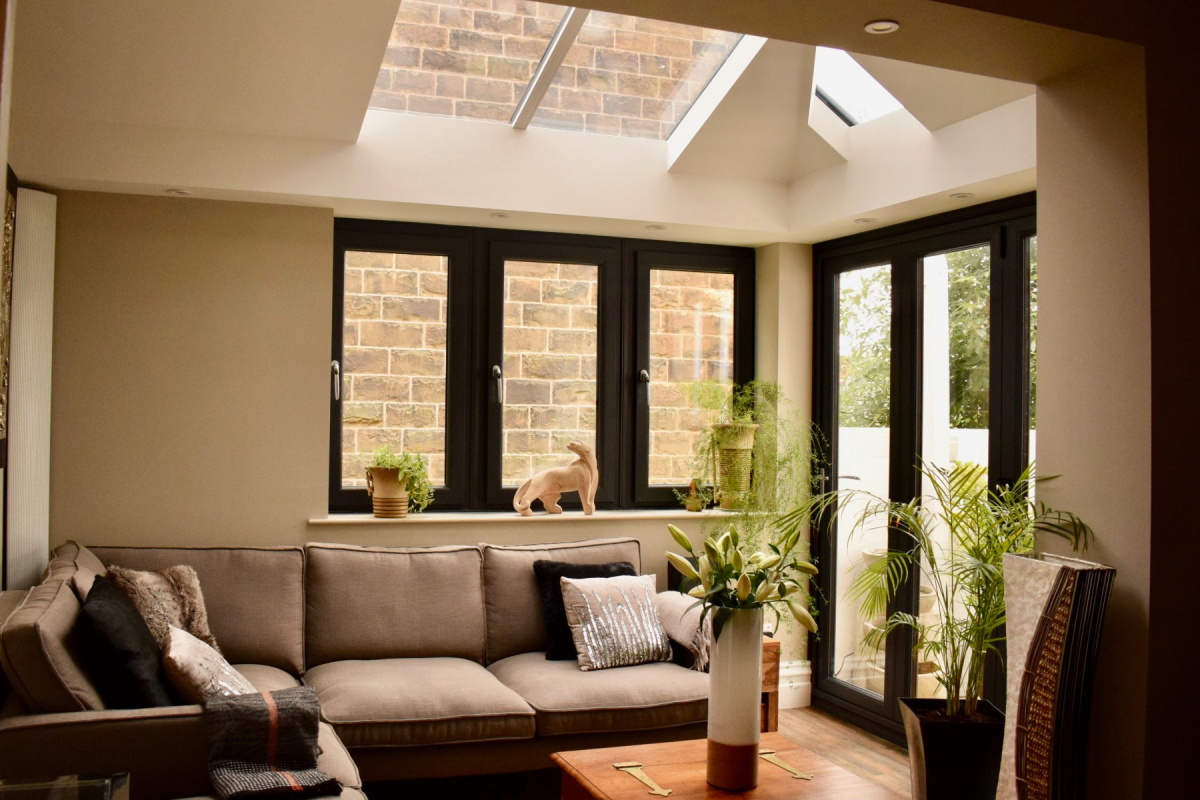
Combining traditional glazing to provide light, superb insulation warmth.
You get the best living space and the best of both worlds! back to contents It’s not surprising that solid roof is the fastest growing sector in our industry with existing conservatory customers looking to upgrade their old glass roof or new customers looking at the technology improvements for new build developments.
Solid roof combines traditional glazing to provide light with super insulating to provide warmth. Basically, you’re getting the best of both worlds! Solid roof offers much more thermal efficiency, and you needn’t worry about losing light as the latest products combine high performing glazing where you most need it and the latest insulation materials to keep you warm.
Be warned, however … avoid the dangers of failing to plan properly when opting for a solid roof for your conservatory. As previously mentioned, conservatories with glazed solid extensions will require Building Regulation Approval regardless of size or whether the room is separated by an external door. A reputable company will be able to coordinate Building Regulations on your behalf the same as they will if you require planning permission. Planning permission law applies to glazed solid roof in the same way that it applies to a conservatory.
One of the conditions attached to permitted development is that “the materials used in any exterior work (other than materials used in the construction of a conservatory) shall be of a comparable appearance to those used in the construction of the exterior of the dwelling house”. For example the development permitted by Class A states that “a pitched roof on an extension should be clad in tiles that give a similar visual appearance to those used on the existing house roof”.
It is wise therefore, before ordering a new solid roof for your existing conservatory, or indeed buying a new conservatory with a solid roof, to first obtain all necessary Building Regulatory Approvals in writing from your local authority.
“Solid Roof replacements are not classified as conservatories but extensions. Subsequently they will need to be passed by Building Regulation Control and possible local planning authorities.”
Lightweight Solid Roof Conservatories in Devon and Cornwall
The Contenders:
UltraRoof

With so many options available to you, we’ll help you through and together we’ll get the right living space for you UltraRoof’s lightweight system creates a beautiful vaulted plastered ceiling inside and on the outside a stunning lightweight tiled finish available in three colours. This allows for the installation of multiple glass panels or Velux Windows. This roof will fit onto pre-existing conservatory frames subject to the correct criteria. The lightweight steel roof with incredible built-in strength makes it ideal for use with bi-folding doors, which in the use of conservatories would generally need to incorporate specially constructed reinforced frames.
LivinRoof
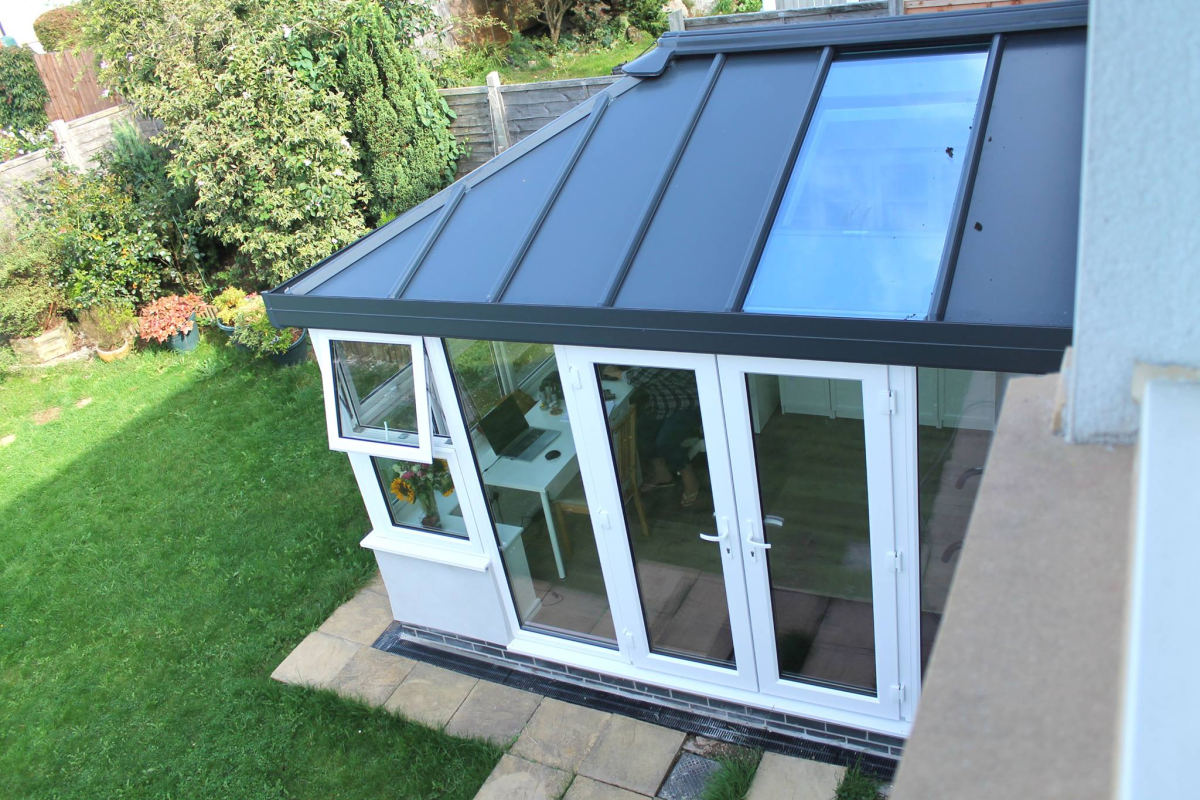
is another lightweight roofing system, constructed with composite external aluminium panel, internal 115mm Kingspan and a skimmed plasterboard finish. This roof bucks the trend and goes for an industrial look, the urban grey panel finish has proven to be very popular. The roof versatility enables you to have the combination of aluminium or glazed roof panelling which also includes glazed shapes.
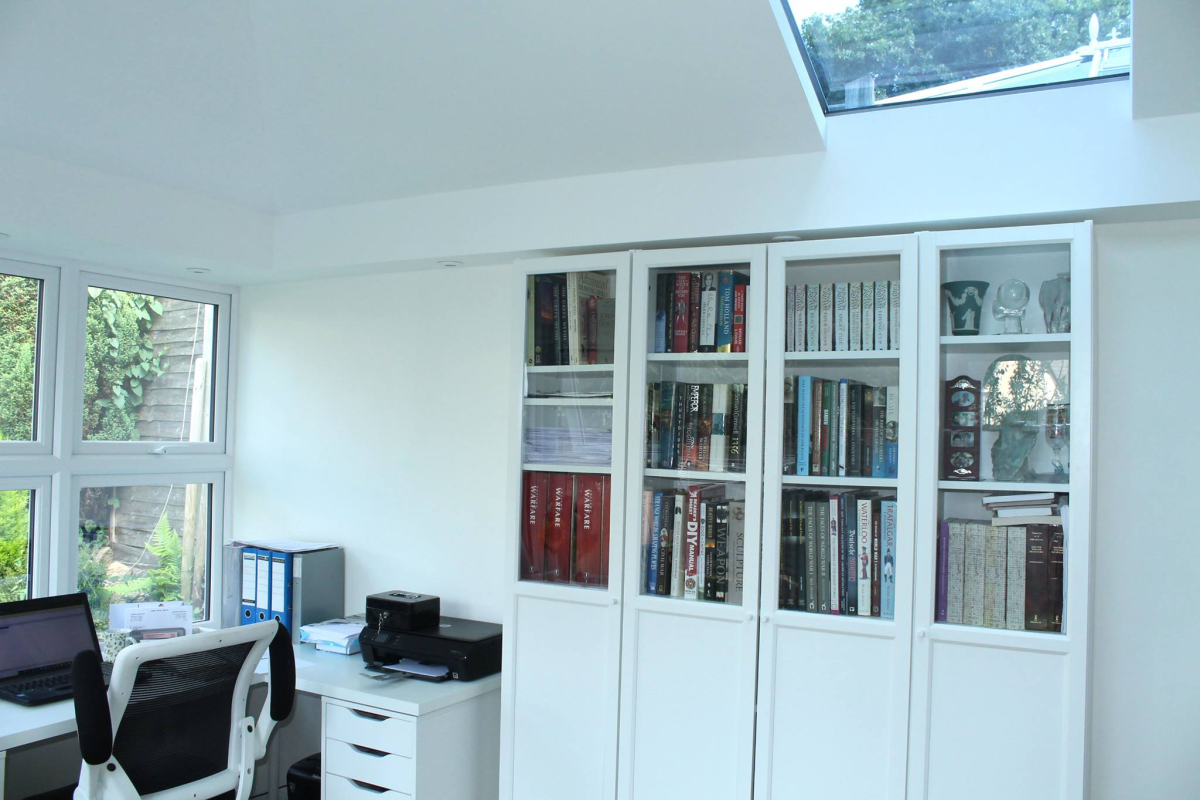
“Whether you choose PVCu or aluminium you need to ensure you allow for suitable insulation, ventilation, shading and heating if you want to use the room all year round.”
Ultrasky Orangeries

Ultrasky is an upgraded classic conservatory roof with an internal steel ladder system that has been specifically developed to provide the luxurious internal design of an Orangery.
By creating an internal pelmet, you reduce the amount of glass area in the roof. This provides shading, better thermal efficiency and greatly enhances the look of the room.
You can choose the width of the internal pelmet from anything between 300mm and 1200mm. A steel ladder cavity is insulated with cavity wool and then plaster boarded and skimmed smooth ready for painting.
The pelmet can be combined with Victorian, Edwardian, Georgian, Lean-to and Gables and is also suitable for use with box gutters, meaning there is almost no limit to the design you can have. To further enhance the usability, down lighters and speakers can be built into the perimeter roof, so you can truly stamp your mark on this living space. A further option is a choice of four external cornice aluminium gutters which adds to the overall external look.
Installing an internal pelmet onto your roof is still classified as a conservatory and does not affect current planning or building regulation requirements.
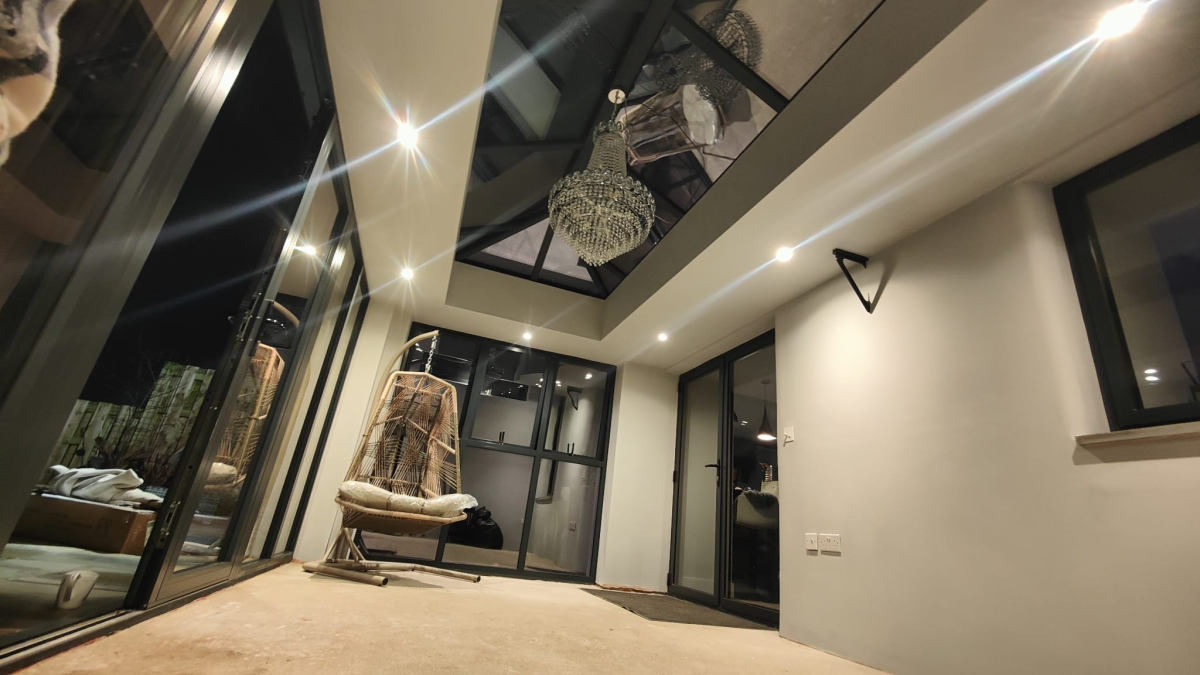
Loggia – Insulated columns, Cornice guttering and internal pelmet

is a roofed gallery used as an open-air room. However, in this concept it is a stylish room, which provides exceptional insulation, structural strength and all year-round usability.
This design style has been achieved by Ultraframe developing a column which provides four times more strength than the equivalent traditional building materials and is five times more thermally efficient than double glazing.
The columns are easily fixed into the base by steel straps and joined to doors and frames. The columns are designed to seamlessly fix to the conservatory roof and Pelmet. Internally, they are foil-backed plaster boarded and skimmed smooth, ready for painting. The columns are available in four standard powder-coated colours: white, cream, Chartwell green and urban grey.
Columns can sit on dwarf walls or go straight down and sit on the base. Alternatively, they can sit on a sill or you can opt for column plinth caps.
Installing Loggia is still classified as a conservatory and does not affect current planning or building regulation requirements. There is no limit to the amount of Loggia columns that you can add, and when you do, you’ll ultimately increase thermally efficiency and achieve insulation U-values which comply with building regulation for open plan living. Loggia can be used in conjunction with all Ultraframe roof products.


Take the time to find the right supplier
This is a investment for you and your family, don’t take any shortcuts. Building a conservatory or glazed extension is not only a major investment, it also involves significant structural changes to your home. The potential fallout from choosing the wrong company to undertake this building work is considerable. So, where do you start looking when you need to find an honest and reputable company that you can trust to give you the advice you need with craftsmanship and a back-up team of service engineers to match?
Finding the right supplier is often the hardest part of any home improvement project. Here is our advice for finding someone you can rely on, plus some guidance on what you should be checking up on when you first start to talk to them.
Word of mouth is brilliant! One of the best places to start your hunt for the best company is with work colleagues, friends and family. Ask the people you know if they can make any recommendations either following work that they have had done themselves, or perhaps if they know someone that has had work done recently.
By working from local reputation and recommendations you will get a clearer idea about the company from the start. Companies with a good reputation are also likely to have been in business longer and this is a good indicator that you will probably be more secure with them and any deposit paid be at least risk.
Be wary of the phone directory, direct mail leaflets that drop on your doormat and local newspaper advertising. Unfortunately, these services do not regulate who can advertise with them so you will need to be a little more careful when dealing with companies that you haven’t heard of before. Once you have started to talk to companies and checked their websites for testimonials, you should ask the following sort of questions.
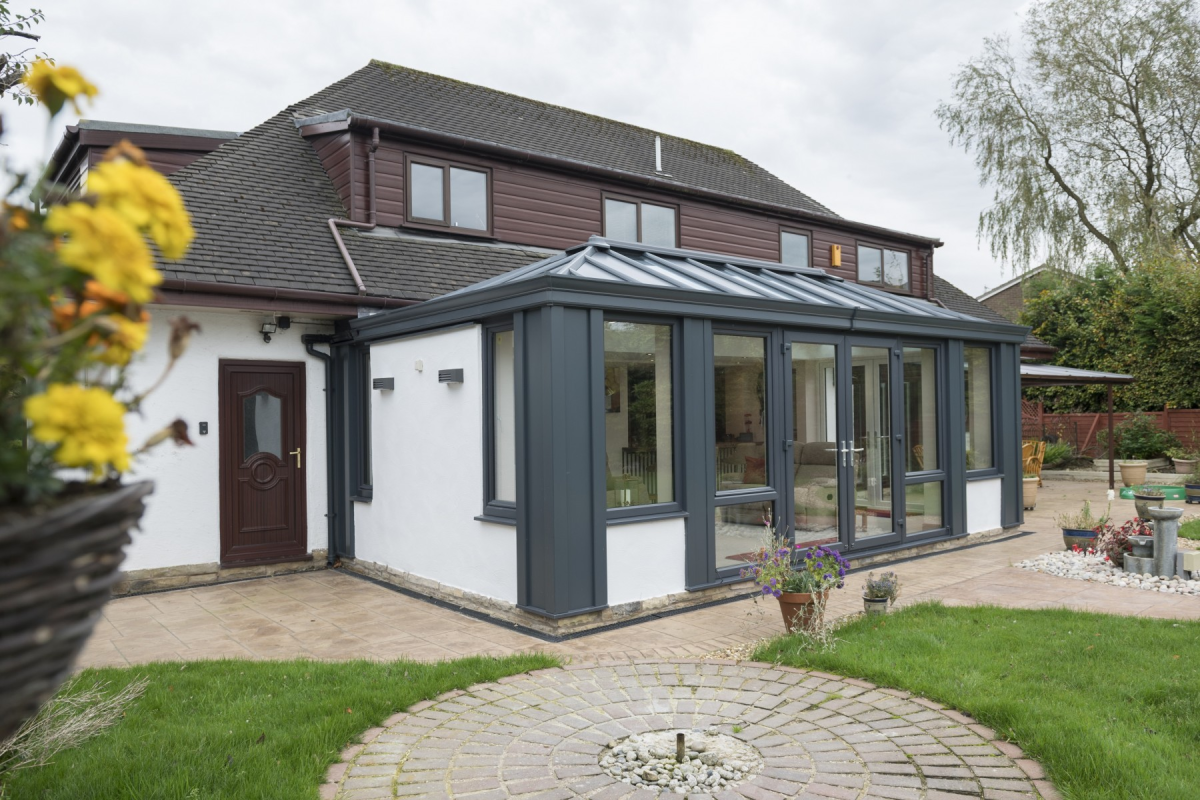
Are they members of any trade associations?
For example, are they FENSA-registered installers, as FENSA regularly carries out independent inspections to ensure their members supply products that comply with the Building Regulations.
Are they Ultraframe approved, Which? Trusted Traders or members of the Glass and Glazing Federation? It is not possible to be members of these highly reputable organisations without having gone through a rigorous assessment process in each case.



How long have they been established in the area?
The longer the better, but check that they have always traded under the same name, as some companies will go bust and, like the proverbial ‘phoenix’, reappear with a very similar name and continue trading. Deposits are lost and guarantees become void in this process, and it is invariably you, the customer, who loses out.
Will they be able to take care of the planning and building regulation side of things?
Again it is quite possible that you will not need planning permission or to build to Building Regulations. However, a reputable company will be able to competently take care of this for you. Remember: If your supplier does undertake this on your behalf then ensure you see the relevant paperwork yourself before any work commences.
Ask to see references or testimonials.
If possible, ring the referees up and ask them if they were happy with the work that was done. Most importantly, ask how problems were resolved. It is unrealistic to expect every installation to be trouble-free, but it is how a company deals with problems that do sometimes occur that is the most important issue.
It’s all the detail
We know you’ve heard it before, but it’s so important.
Do you have to pay a deposit?
Companies will vary on what they expect you to pay up front, you shouldn’t be expected to pay the full amount in advance. Most companies will have further stage payment requirements for you to meet as the build moves forward.
What guarantee is offered?
FENSA-registered companies must provide independent insurance-backed guarantees but these only cover you if the company goes out of business. What is more important is how they handle their after sales support generally. Again, check with the reference if the company managed ‘under guarantee’ call-backs efficiently and without hassle.
Does the company carry public liability insurance?
Building a glass extension is a major home improvement project so you need the peace of mind of knowing your supplier is fully insured should something go wrong on-site. Smaller, one-man operations may offer you a cheaper structure but not have this valuable protection.
Finance options.
There are a number of ways you can pay for a glass extension. Consider any finance options you are offered carefully as personal loan or mortgage charges may be lower. Taking independent advice may help you to find the best option.
Finally, and most importantly… Read the details of any contract very carefully and ask for a fully itemised list of the proposed works. Ask for full detailed drawings and only when you are totally satisfied with everything should you sign off the work to be undertaken.
Beware: ‘Phoenix Factor’ – Even with all of the ‘consumer protection’ available today, there are still companies that are seemingly able and happy to rip their customers off, cease trading and then re-emerge under a new name, leaving their liabilities behind them, so check company histories carefully. back to contents
Installation & beyond
By planning ahead you can ensure the build project proceeds as quickly and efficiently as possible. We also look further down the line than just the installation stage, ensuring you remain happy with your glass extension long after it is completed.
Getting ready
As with most things, getting prepared ahead of your installation date is key to its success. Even if you are fortunate enough that all your installation takes place in the middle of a dry summer, when conditions for building work are more favourable, you should realistically expect some disruption.
Ahead of the installation you should check with your supplier what access they will need for bringing materials and equipment to site. If you are located on a busy road then there may be better times of the day for deliveries to unload. As the build project is likely to take several weeks it is probably impossible for you to be there the whole time. Planning and working out when access to the inside of your home is needed will help to ensure the project runs as smoothly and efficiently as possible.
Clear the build site carefully and keep the area around the site as clear as possible, too. I
f you have overhead or adjacent telephone or electricity cables you may need to get them moved or protected for the work to take place, and for the cables to be maintained in the future. Your supplier will be able to advise you on this.
If you have a pet that is likely to be upset by all the disruption, then ask someone to look after it for a few days. If not, then take the time to introduce it to the workmen so that neither party has any unpleasant surprises!

On the day
Be hospitable to the workmen and it will reap rewards. Offer them drinks or the facilities to make their own and show them which toilet you wish them to use.
Check with them what work they are expecting to do and ensure it matches your own expectations. If something doesn’t seem right or if you have any queries, then take it up with the customer services team at the company immediately so that it can be rectified early on.
Inspect the work at the end of each day and make a note of anything that needs attention so that you can discuss it with the installers the next day – they really won’t thank you for pointing something out right at the end of the project that they could have put right much earlier!
A bit more info for you…
We think we’ve pretty much covered everything, but then there’s always something else to let you know. Have a look at the next couple of pages for the finishing touches, they may well save you time and money!
When the job is done
At the end of the installation look around it carefully and ensure that you understand how all the windows, doors and roof vents work as well as how the heating and ventilation systems operate.
Check that any ‘making good’ of the surrounding area that you agreed to have done has been completed satisfactorily and ensure that you have all the window and door keys safely in your possession before the installers leave.
Finally, if you are happy with the work then it is only fair to pay up promptly.
After sales service
It is sometimes necessary to ask for minor adjustments to be made to the doors, windows, and roof of your glass extension and, provided you have a warranty that covers remedial work, then your supplier should come back and carry this out within a set period.
To keep everything working properly, your supplier will advise the best maintenance routine for you. You should ensure this maintenance is carried out otherwise your guarantee may become invalid which could mean you have to pay for costly repairs that could easily have been avoided.
Buying a conservatory or orangery represents a considerable investment and making mistakes in the specification can be costly. But how do you assess one quotation for a glass extension against another when there are so many variables? The answer is that there is simply no shortcut to carefully researching what you are offered. Always try to get at least two quotations and remember that the cheapest is not necessarily always the best investment for you in the long run. Here is our essential checklist of what to remember when you are buying a new conservatory or orangery for your home, plus our top tips for buying a double-glazed glass extension you’ll be happy to live with for years to come.
A bit more info for you…
Security is key
Don’t overlook the locking options available on the structures you look at. What is standard for one company might be an optional extra for another. Most modern replacement windows and doors in conservatories and orangeries feature multi-point locking ‘as standard’. This is a locking system that secures at more than just one point in the window or door frame. Some will also offer a night vent position which gives you a lockable, partially open position – remember though that any window left open, even if only slightly, is still a security risk.

Contracts & Warranties
Ask for, and carefully scrutinise the contract for your glass extension to ensure it includes everything you asked for. The benefit of buying from a well-established company is that they are more likely to be reputable and give you the service and finish you want. Warranties should also be carefully reviewed – ones that you must pay extra for may only cover you if the company goes bust. Always ask for warranty details in writing and check what it covers very carefully.
Unbelievable Offers
Don’t be tempted to buy on a 50% off special price on the day offer. Remember: if a price seems too good to be true, it usually is.

Deposits
Be immediately wary of any company that asks for more than a third of the cost up front, unless your order is particularly large, or you are purchasing supply only.
Delivery & Installation
Be clear with your chosen supplier about the expected delivery and installation date and include it in your contract with them. It’s also worth checking how long they expect the installation to take. Good companies will usually keep you posted and confirm their arrival a few days before the due date. Ensure you’re prepared for them.
Finally, more ways to get the right double glazed glass extension for your home… Glass roofs
Consider the glass
for the roof of your double-glazed structure very carefully – get it wrong and you might find the room unbearable to use. Look for a supplier that is happy to give you a choice of glass or polycarbonate, or even a solid roof.
Don’t rush
Take the time to look at all the available materials – PVCu and aluminium – before you make your final decision. Look at the finishing and on-going maintenance carefully, as quality differs a lot between materials and systems.
Check and check again
Ensure you check whether or not you will need planning permission and/or Building Regulation approval. Only let an experienced supplier apply on your behalf, and ensure you see the paperwork before the work starts.

Why Realistic?
Here at Realistic we have all the know-how to help you find the perfect glazed extension for your home. Garden room, sitting room, playroom, dining room, home office or perhaps even a personal gym – the uses are many and varied for the conservatories and orangeries we build for our customers. Realistic has become a byword for conservatories that are thoughtfully designed, well built and expertly project-managed to ensure your installation runs smoothly from start to finish.
Our showroom, in Saltash, has a range of products for you to walk around and our consultants have the knowledge and passion to ensure that we can bring your dream to life. All our staff – are employed.
realistic.uk.com 01752 841008
Tamar View Nurseries, Callington Road, Saltash, Cornwall. PL12 6PH

